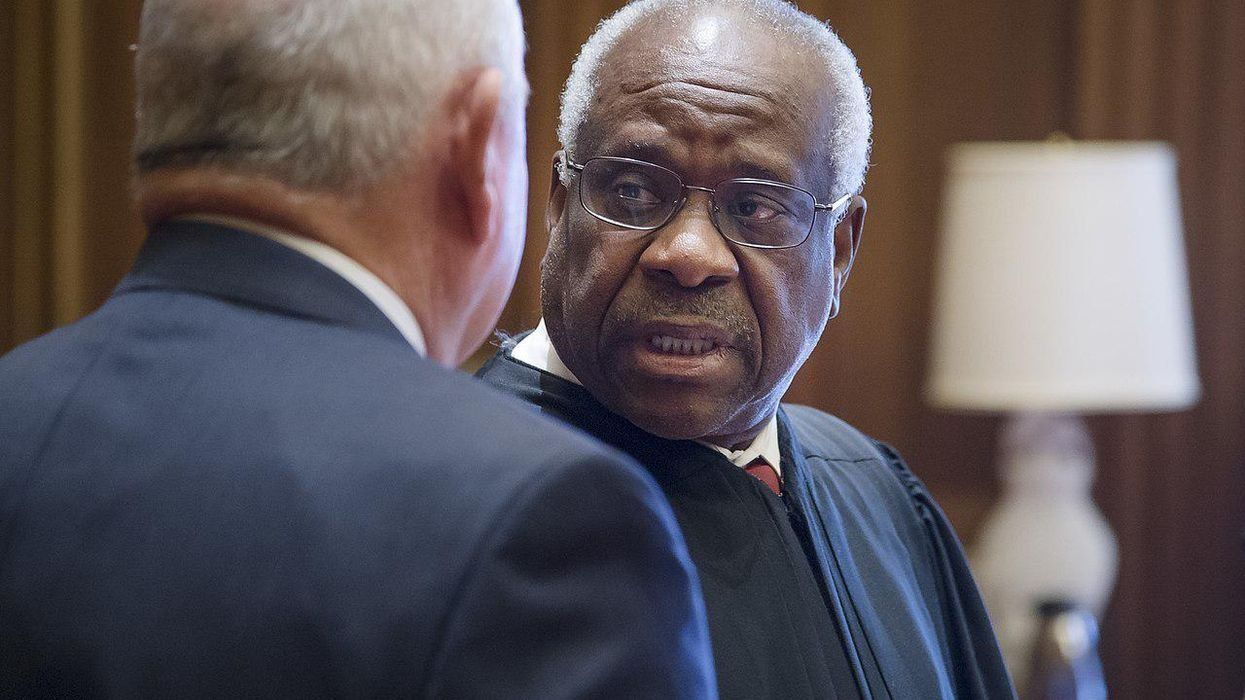How Clarence Thomas’ judicial record undermines his defense in Harlan Crow scandal

U.S. Supreme Court Justice Clarence Thomas with Sonny Purdue in 2017 (Creative Commons)
April 20, 2023 | 11:25AM ETBank
Throughout his 32 years on the U.S. Supreme Court, far-right Justice Clarence Thomas, now 74, has been controversial. The controversy started even before he was seated when attorney Anita Hill accused him of sexual harassment during his U.S. Senate confirmation hearings in 1991, and it continues many years later as Thomas' critics scrutinize everything from his wife Ginni Thomas' efforts to overturn the 2020 presidential election to the justice's relationship with billionaire Republican megadonor Harlan Crow.
On April 6, ProPublica reported that for "over 20 years," Thomas had "been treated to luxury vacations" by Crow and failed to report it. And on April 13, ProPublica reported that Thomas had sold Georgia property to Crow in 2014 and failed to report that as well.
Thomas has defended his relationship with Crow, insisting that he has done nothing wrong. According to Thomas, "personal hospitality from close personal friends" didn't need to be reported under federal ethics laws. But journalist Ed Pilkington, in an article published by The Guardian on April 20, offers some reasons why Thomas' explanation is problematic.
READ MORE: Why Clarence Thomas’ 'hilarious' explanation for gifts from GOP megadonor falls painfully flat
"A close look at Thomas' judicial activities from the time he became friends with Crow, in the mid-1990s, suggests that the statement might fall short of the full picture," Pilkington explains. "It reveals that a conservative organization affiliated with Crow did have business before the Supreme Court while Thomas was on the bench. In addition, Crow has been connected to several groups that, over the years, have lobbied the Supreme Court through so-called 'amicus briefs' that provide legal arguments supporting a plaintiff or defendant."
Pilkington notes that in 2003, the right-wing Club for Growth — which Crow was a part of — lobbied against campaign finance restrictions and the McCain-Feingold Act of 2002.
"The legislation placed new controls on the amount of 'soft money' political party committees and corporations could spend on elections," Pilkington recalls. "On appeal, a consolidated version of the lawsuit, Mitch McConnell v. FEC, was taken up by the Supreme Court. In a majority ruling, the Court allowed the most important elements of the McCain-Feingold Act to stand, though they were later nullified by the Supreme Court's contentious 2010 Citizens United ruling. Thomas was livid. He issued a 25-page dissenting opinion that sided heavily with the anti-regulation stance taken by the Club for Growth and its right-wing allies."
The journalist points out that although Crow "has never personally come before the Supreme Court," the Texas billionaire has "served on the boards of at least three conservative groups that have lobbied the Supreme Court through amicus briefs."
READ MORE: Clarence Thomas defends luxury vacations paid for by billionaire Republican donor
"Early in his friendship with Thomas," Pilkington reports, "Crow sat on the national board of the now defunct Center for the Community Interest, which filed at least eight amicus briefs in Supreme Court cases backing right-wing causes such as sweeping crime off the streets and countering pornography. He has also been a trustee for more than 25 years of the American Enterprise Institute, a think tank advancing free enterprise ideas that has filed several supporting briefs to the Court. In 2001, AEI gave Thomas a bust of Abraham Lincoln then valued at $15,000."
Read The Guardian's full report at this link.